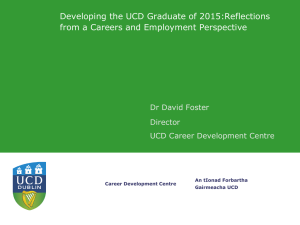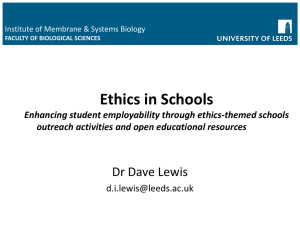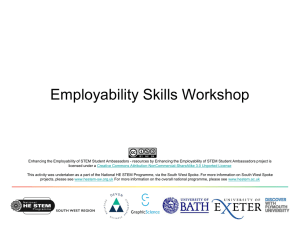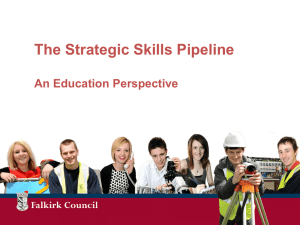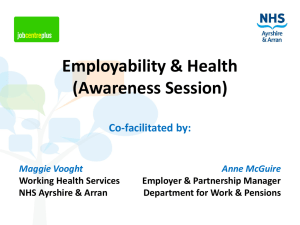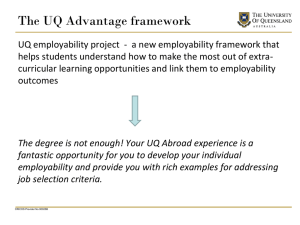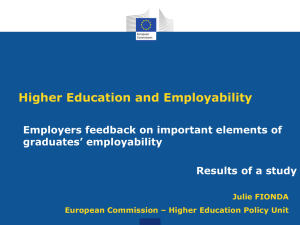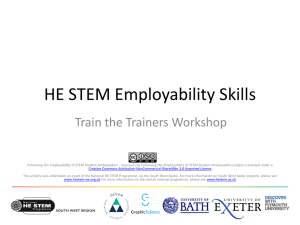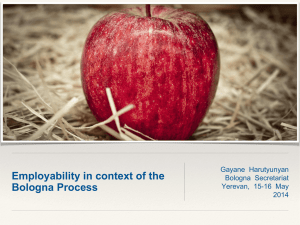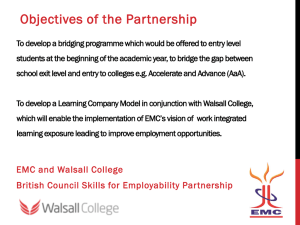Third Sector Collaborations That Make a Difference
advertisement
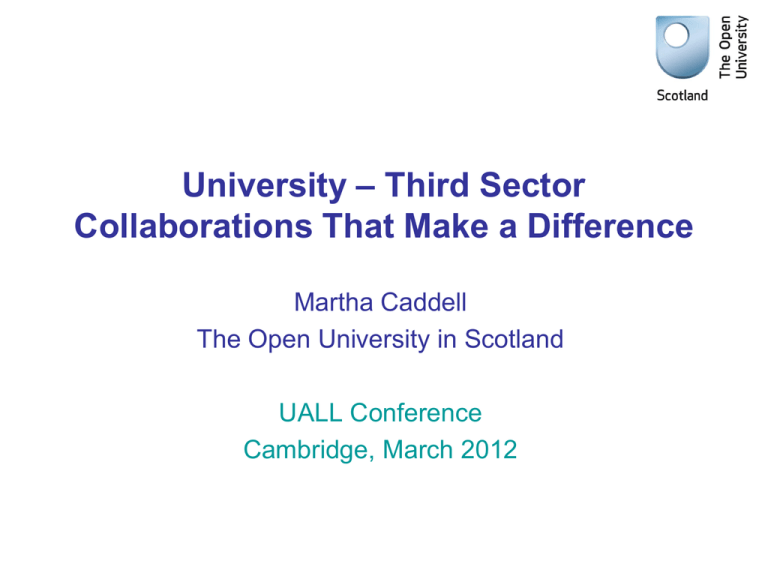
University – Third Sector Collaborations That Make a Difference Martha Caddell The Open University in Scotland UALL Conference Cambridge, March 2012 Overview • HE for the social good: The significance of collaboration and partnerships. • Framing debates: Employability, Grad Attributes • Exploring the ‘HE difference’ – Case study 1: Third Sector Internships Scotland – Case study 2: Skills for community development. • Challenging questions: At the interface of work / study. Current Concerns • Graduate attributes / employability debates. – Embedding in curriculum … but what do we know of impact, understanding and articulation of these (Cranmer 2006). – Diversity of life stages at which concerns are engaged with. • Skills development discussions – Individualising concerns? (Keep & Mayhew 2010). – Wilson Report – internships for all? • ‘Making a difference’ at the study: work interface? – Interface is key. – The ‘HE’ difference: Case studies. Case Study 1 Third Sector Internships Scotland www.3rdsectorintern.org.uk Third Sector Internships Scotland • Collaboration between Scottish universities and Third Sector: to enhance students employability and the capacity of the TS. • Third sector engagement strategy: work with third sector organisations, Interfaces and Social Enterprise Networks to develop job descriptions and offer comprehensive support pre, during and post-internship. • Higher education engagement strategy (students, academic staff, student associations, careers services): open to all students across all Scottish HEIs and provide support throughout internship process. • Learning/research: from employers, interns and internship context. An Overview • Part time and full time paid placements – Real life application process, with guidance and feedback. • Employability, not ‘just’ jobs. – Offered alongside study, but not linked directly to studies. • High demand from employers and students. • Success of internships – From student and employer perspective. – Economic, social and educational impact. • Need to consider support for the ‘mass’. Some examples • • • • • • • • Aberdeen Foyer Cothrom Re-store Edinburgh Cyrenians Furniture Plus Talking Mats Volunteer Centre Dundee Ionad Cahluim Chille Ile BEES Communications Development Officer (South Uist) Food and Health Project Marketing and Events (Fife) Sales and Marketing (Stirling) Online Learning Development Cultural Tourism (Islay) Researcher (Jedburgh) Employer and student perspectives Video Employer and student perspectives Video Case Study 2 Employability for Community Development Employability for Community Development • Students as change agents. – Employers, volunteers, community activists. • Students: Using HE to make a difference. – Lifelong learning perspective – broadens employability focus. – “ … and enhancing their contribution to society.” – Highlights multiple motives for study. • Student engagement in community development. – Study: Work interface from a different perspective. – Motives and application of skills. • To community as well as individual goals. Case Studies • Leigh • Established bee conservation group ‘On the Verge’ whilst studying environmental studies. “The idea for On the Verge came about through a convergence of different things which were happening in my life. But I honestly don’t think I would have had the impetus to make the On the Verge project happen if I hadn’t been studying with the OU at that time. I would have sat with the idea and it would have fizzled out.” • Kath • Community renewable energy project – Specific study skills directly applicable to work. • Time management, multimedia, report writing. Emerging Themes • HE making a difference. – Fresh skills and ideas … making an impact on TS organisations. – Collaboration and partnerships are key. • Employers, community groups, students. • Articulation and application of skills and knowledge. – Engagement at ‘interface’ impacts both ways. – Skills articulation needs facilitation. • Diversity of experiences and needs – Students: Beyond a linear model of employability. – Employer engagement: support and assistance. – Practical challenges. Challenging Questions • How can we make university – third sector collaborations meaningful … and workable? – Specific ‘employer engagement’ challenges. • Learning motives and application of learning: How to recognise diversity of contexts and needs? • What broader social goods accrue from such collaboration and interaction? – Impact on study experience? – Impact on volunteering and awareness of TS? – Awareness and responsiveness to broader social concerns? Dr Martha Caddell Learning and Teaching Coordinator, The OU in Scotland Co-Director (Research and Learning), TSIS Email: Martha.Caddell@open.ac.uk
